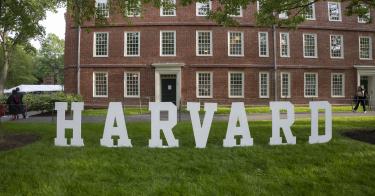Taxpayer funding for higher education is a privilege, not an entitlement. That funding is conditioned on universities complying with civil rights law that ensures that no one is denied full access to their education on the basis of race, color or national origin.
The Trump administration has informed Harvard and several other elite universities—including Brown, Columbia, Cornell, Northwestern and Princeton—that it is freezing substantial portions of their federal funding over concerns that they grossly and repeatedly failed to fulfill their civil rights obligations by addressing antisemitic harassment and discrimination against Jewish students.
The country’s oldest, richest and arguably most influential university, Harvard has been the government’s primary target. The Trump administration has frozen some $3 billion in grants and contracts to Harvard that predominantly affect medical and scientific research, including $510 million in the last week alone. The university fired back last week by expanding a lawsuit it filed on April 22, asserting, among other things, that the Trump administration is infringing on the free speech and the autonomy of a private institution.
The truth is that neither academic freedom nor the desire for autonomy exempts Harvard or any other institution that receives federal funds from complying with Title VI of the Civil Rights Act. If Harvard’s or any other institution’s understanding of free speech and autonomy is inconsistent with civil rights law, then they should decline federal money, just as Hillsdale College in Michigan, Faith Bible College in Maine, Patrick Henry College in Virginia and several other colleges have done.
>>> Harvard and DEI: An Expensive Lesson
After the Oct. 7, 2023, Hamas attacks on Israel and the widespread campus protests against Israel’s war in Gaza, Harvard did little to nothing when a number of Jewish students were harassed by pro-Palestinian protesters, blocked from walking across campus and even physically assaulted.
A Harvard law school student who was arrested for assault and battery for allegedly harassing and preventing a Jewish student from crossing an anti-Israel protest to reach his dorm was later rewarded with a prestigious Harvard Law Review fellowship and featured in a positive social media post by the university. (The case ended with the judge sending the law student, who pleaded not guilty, to anger management training and community service rather than holding a trial.)
In another incident, senior Harvard administrators handed out Twizzlers and burritos to students who occupied a university building demanding a ceasefire to the Gaza war. A report by the U.S. House of Representatives Committee on Education and the Workforce concluded the university should have disciplined these students, rather than feeding them.
Jewish students have reported being harassed by peers and faculty unless they denounced Zionism, the movement that supports a Jewish national state in the historic homeland of the Jews, an integral part of Jewish identity for most Jews.
In its lawsuit, Harvard states that it “rejects antisemitism and discrimination in all of its forms and is actively making structural reforms to eradicate antisemitism on campus”—words that acknowledge that violations have occurred. Indeed, a report by a Harvard task force on antisemitism that was more than a year in the making reported scores of transgressions in need of correcting. Harvard president Alan Garber, who is Jewish, has acknowledged “real problems,” though he asserts that the school is making significant progress toward preventing future transgressions.
But there are good reasons to doubt that Harvard has fixed itself or will be able to do so without significant external pressure. Simply forming the antisemitism task force showed the extent of the obstacles. The initial advisory board created after Oct. 7, 2023 to fight antisemitism was disbanded and one member, Rabbi David Wolpe, resigned because, he said, the campus environment showed, “I cannot make the sort of difference I had hoped.” Two members of the task force that followed—one of them its co-chair—resigned as well, reportedly because they also doubted that Harvard was serious about addressing widespread problems on campus.
After repeated delays, the report finally released last month provided “a scathing account of the university … finding that antisemitism had infiltrated coursework, social life, the hiring of some faculty members and the worldview of certain academic programs,” according to The New York Times.
One does not need to settle disputes over whether anti-Zionism is antisemitic or whether shouting “globalize the intifada” in Harvard Yard is targeted harassment to agree that blocking students from crossing campus or physically assaulting them because they are Jewish violates their civil rights.
And there is no ambiguity that Harvard’s failure to enforce its own policies to discipline students who interrupt classes, establish encampments and occupy university buildings interferes with the ability of Jewish students—and non-Jewish students—to access their education.
>>> Elite Universities Should Stop Digging Themselves Into a Hole
Defenders of the universities singled out by the Trump administration object that freezing federal funding jeopardizes life-saving medical research. But universities and medical schools shouldn’t be allowed to hold scientific research hostage. The Trump administration has indicated that Harvard could immediately unfreeze that money if it took 10 steps to remedy its civil rights violations.
Nine of these steps are directly related to past infractions or involve governance reforms to prevent future violations, such as instituting a ban on face-coverings at public protests and reorganizing academic units identified by Harvard’s own task force as fomenting antisemitism. Only the 10th step, the insistence that Harvard promote “viewpoint diversity” among its faculty and students, strays beyond the enforcement of civil rights law.
Mandating viewpoint diversity may be government overreach, but it is good educational practice and political common sense for Ivy League universities to remedy the fact that only two faculty members in the eight-school Ivy League conference donated to the Trump campaign, according to a review I made of campaign contributions. In comparison, there were almost 900 contributions made to Harris. Being so politically one-sided may not be a civil rights violation, but it is pretty darn foolish for institutions that derive so much revenue from taxpayers.
Elite universities may have to do without some federal funding while the courts consider the matter. They are not excused from complying with civil rights law just because they do important work. No one is above the law, including Harvard.
This piece originally appeared in U.S. News





